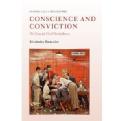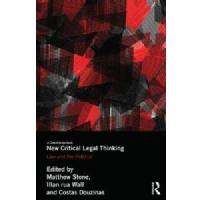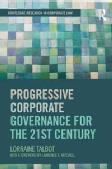Books Published by Staff in 2012
Kimberlee Brownlee "Conscience and Conviction"
 This book shows that civil disobedience is generally more defensible than private conscientious objection.
This book shows that civil disobedience is generally more defensible than private conscientious objection.
Part I explores the morality of conviction and conscience. Each of these concepts informs a distinct argument for civil disobedience. The conviction argument begins with the communicative principle of conscientiousness (CPC). According to the CPC, having a conscientious moral conviction means not just acting consistently with our beliefs and judging ourselves and others by a common moral standard. It also means not seeking to evade the consequences of our beliefs and being willing to communicate them to others. The conviction argument shows that, as a constrained, communicative practice, civil disobedience has a better claim than private objection does to the protections that liberal societies give to conscientious dissent. This view reverses the standard liberal picture which sees private 'conscientious' objection as a modest act of personal belief and civil disobedience as a strategic, undemocratic act whose costs are only sometimes worth bearing.
The conscience argument is narrower and shows that genuinely morally responsive civil disobedience honours the best of our moral responsibilities and is protected by a duty-based moral right of conscience.
Part II translates the conviction argument and conscience argument into two legal defences. The first is a demands-of-conviction defence. The second is a necessity defence. Both of these defences apply more readily to civil disobedience than to private disobedience. Part II also examines lawful punishment, showing that, even when punishment is justifiable, civil disobedients have a moral right not to be punished.
Rebecca Probert "The Changing Legal Regulation of Cohabitation"
The Legal Regulation of Cohabitation examines hundreds of reported and unreported cases, as well as legislation, policy papers, debates in Parliament to show how the legal treatment of cohabiting couples has been transformed over the past four centuries – from punishment as fornicators in the seventeenth century to eventual acceptance as family in the late twentieth century.
Alongside this, drawing on thousands of newspaper reports and magazine articles, it charts how the language used to refer to cohabitation has changed over time – from the denunciatory phrases of the early part of the period, through the namelessness of cohabitation in the nineteenth century, wartime ‘unmarried wives’, the ‘living in sin’ of the mid-twentieth century, the ‘stable illicit unions’ of the Law Commission’s 1966 report on divorce, the ‘common-law wives’ of the 1970s, the ‘live-in lovers’ of the 1980s and early 1990s to the ‘partners’ of today.
These different terms both influenced and were influenced by policy debates and public perceptions of cohabitation. Law and language were also intertwined with the third key theme of the book – a reassessment of the incidence of cohabitation in past times. Having carried out innovative cohort studies of over 5,000 couples, the book provides new and more accurate evidence of the extent (or rather the rarity) of cohabitation in earlier centuries.
Andrew Williams "A Very British Killing"
 On September 15, 2003 Baha Mousa, a hotel receptionist, was killed by British Army troops in Iraq. He had been arrested the previous day in Basra and was taken to a military base for questioning. For forty-eight hours he and nine other innocent civilians had their heads encased in sandbags and their wrists bound by plastic handcuffs and had been kicked and punched with sustained cruelty. A succession of guards and casual army visitors took pleasure in beating the Iraqis, humiliating them, forcing them into stress positions in temperatures up to 50 degrees Centigrade, and watching them suffer in the dirty concrete building where they were held. Other soldiers, officers, medics, the padre, did not take part in the violence but they saw what was happening and did nothing to stop it. Some knew it was wrong. Some weren't sure. Some were too scared to intervene. But none said anything or enough until it was far too late and Baha Mousa had been beaten to death.
On September 15, 2003 Baha Mousa, a hotel receptionist, was killed by British Army troops in Iraq. He had been arrested the previous day in Basra and was taken to a military base for questioning. For forty-eight hours he and nine other innocent civilians had their heads encased in sandbags and their wrists bound by plastic handcuffs and had been kicked and punched with sustained cruelty. A succession of guards and casual army visitors took pleasure in beating the Iraqis, humiliating them, forcing them into stress positions in temperatures up to 50 degrees Centigrade, and watching them suffer in the dirty concrete building where they were held. Other soldiers, officers, medics, the padre, did not take part in the violence but they saw what was happening and did nothing to stop it. Some knew it was wrong. Some weren't sure. Some were too scared to intervene. But none said anything or enough until it was far too late and Baha Mousa had been beaten to death.
This book tells the inside story of these crimes and their aftermath. It examines the institutional brutality, the bureaucratic apathy, the flawed military police inquiry and the farcical court martial that attempted to hold people criminally responsible. Even though a full public inquiry reported its findings into the crimes in September 2011, its mandate restricted what it could say. The full story, told with the power of a true-crime expose, shows how this was not simply about a few bad men or 'rotten apples'. It shines a light on all those involved in the crime and its investigation, from the lowest squaddie to the elite of the army and politicians in Cabinet.
"New Critical Legal Thinking" Edited by: Matthew Stone, Illan rua Wall and Costa Douzinas

New Critical Legal Thinking articulates the emergence of a stream of critical legal theory which is directly concerned with the relation between law and the political. The early critical legal studies claim that all law is politics is displaced with a different and more nuanced theoretical arsenal. Combining grand theory with a concern for grounded political interventions, the various contributors to this book draw on political theorists and continental philosophers in order to engage with current legal problematics, such as the recent global economic crisis, the Arab spring and the emergence of biopolitics. The contributions instantiate the claim that a new and radical political legal scholarship has come into being: one which critically interrogates and intervenes in the contemporary relationship between law and power.
Hugh Beale "Mistake and non-disclosure of facts"

In this book Hugh Beale examines the case for reforming the law on mistake and non-disclosure of fact to bring English law closer to the law in much of continental Europe. There, and in common law countries like the US, a party may avoid a contract for mistake of fact on a more liberal basis, and a party who deliberately keeps silent knowing that the other party is making a mistake may be guilty of fraud. This is not necessarily the case in England and Wales.
Developing a proposal for law reform, the author concedes that the English courts require a law that puts great emphasis on certainty and expects parties to look out for their own interests; but posits that this individualistic approach is not suitable for smaller businesses which are less sophisticated and which are likely to be making low value contracts, so that relative cost of taking advice will be high. He argues that the solution may not be to reform English contract law generally, but to support the development of an optional instrument on contract law, along the lines of the Common European Sales Law recently proposed by the European Commission.
This measure is aimed specifically at the needs of small and medium enterprises, and contains the protective rules found in the other jurisdictions. It is aimed primarily at cross-border sales, but Member States would be given the option of adopting it for domestic transactions too. This would give small businesses the choice of using the current "hard-nosed" law or adopting the more protective optional instrument, recognizing that different parties require different things from the law governing their contract.
Lorraine Talbot 'Progressive Corporate Governance for the 21st Century' (Routledge)
 Progressive Corporate Governance for the 21st Century is a wide ranging and ambitious study of why corporate governance is the shape that it is, and how it can be better. The book sets out the emergence of shareholder primacy orientated corporate governance using a study of historical developments in the United Kingdom and the United States. Talbot sees shareholder primacy as a political choice made by governments, not a ‘natural’ feature of the inevitable market. She describes the periods of progressive corporate governance which governments promoted in the middle of the 20th century using a close examination of the theories of the company which then prevailed. She critically examines the rise of neoliberal theories on the company and corporate governance and argues that they have had a negative and regressive impact on social and economic development. In examining contemporary corporate governance she shows how regulatory styles as informed and described by prevailing regulatory theories, enables neoliberal outcomes. She illustrates how United Kingdom-derived corporate governance codes have informed the corporate governance initiatives of European and global institutions. From this she argues that neoliberalism has re-entered ex command transition economies through those United Kingdom and OECD inspired corporate governance Codes over a decade after the earlier failed and destructive neoliberal prescriptions for transition had been rejected. Throughout, Talbot argues that shareholder primacy has socially regressive outcomes and firmly takes a stand against current initiatives to enhance shareholder voting in such issues as director remuneration. The book concludes with a series of proposals to recalibrate the power between those involved in company activity; shareholders, directors and employees so that the public company can begin to work for the public and not shareholders.
Progressive Corporate Governance for the 21st Century is a wide ranging and ambitious study of why corporate governance is the shape that it is, and how it can be better. The book sets out the emergence of shareholder primacy orientated corporate governance using a study of historical developments in the United Kingdom and the United States. Talbot sees shareholder primacy as a political choice made by governments, not a ‘natural’ feature of the inevitable market. She describes the periods of progressive corporate governance which governments promoted in the middle of the 20th century using a close examination of the theories of the company which then prevailed. She critically examines the rise of neoliberal theories on the company and corporate governance and argues that they have had a negative and regressive impact on social and economic development. In examining contemporary corporate governance she shows how regulatory styles as informed and described by prevailing regulatory theories, enables neoliberal outcomes. She illustrates how United Kingdom-derived corporate governance codes have informed the corporate governance initiatives of European and global institutions. From this she argues that neoliberalism has re-entered ex command transition economies through those United Kingdom and OECD inspired corporate governance Codes over a decade after the earlier failed and destructive neoliberal prescriptions for transition had been rejected. Throughout, Talbot argues that shareholder primacy has socially regressive outcomes and firmly takes a stand against current initiatives to enhance shareholder voting in such issues as director remuneration. The book concludes with a series of proposals to recalibrate the power between those involved in company activity; shareholders, directors and employees so that the public company can begin to work for the public and not shareholders.

